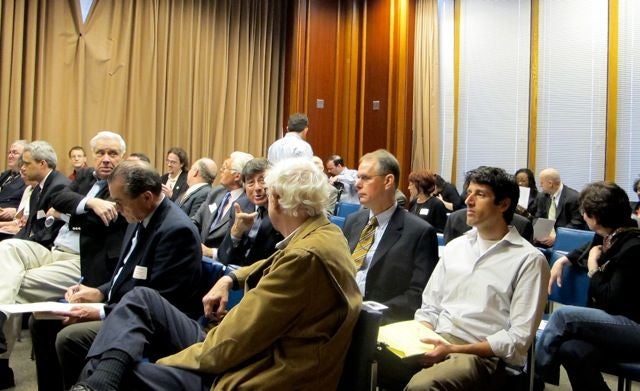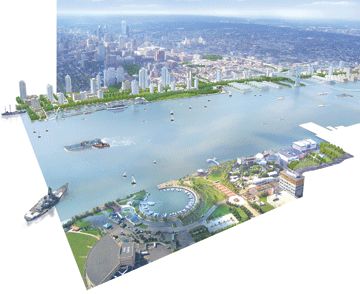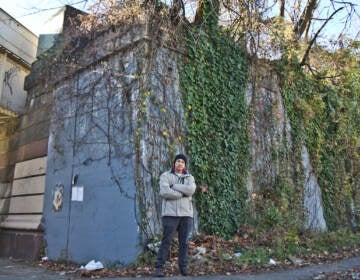Central Delaware ‘POD’ rules vague, opponents say
The not uncommon three-way power struggle between the Philadelphia City Planning Commission, various neighborhood associations and a coalition of commercial real estate developers played out again Tuesday afternoon, when the Planning Commission adopted “plan of development” (POD) regulations for the Central Delaware Riverfront Overlay District.
This time the commissioners found themselves in the position of being opposed by both the developers and the community groups, who complained that the rules are open to misinterpretation, are too “open-ended” and lack clarity and definitive terms.
Craig Schelter, executive director of Development Workshop Inc., told PlanPhilly after the hearing – in no uncertain terms – that he was angry with the approval. “We’re going to appeal,” he said.
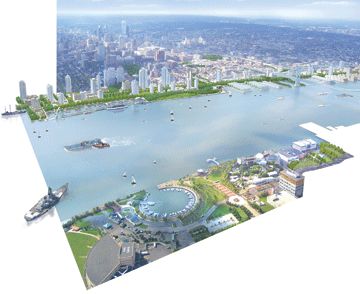
While the riverfront overlay is in place, a POD approval will be needed for all properties east of Delaware Avenue or adjacent to the Delaware River. The regulations and submission requirements include proposed uses, details regarding hearings, deadlines, base zoning, density (scale, height, massing, etc.), landscaping, streetscaping and traffic, layout and design, and more.
Schelter, a former executive director of the Planning Commission, in his remarks to the commissioners, said, “There are no standards here, just an open-ended list of developer submission requirements” and time frames. He said the five-page document effectively “turns the Planning Commission into the Zoning Board of Adjustment, but without the due process.” He called the regulations a “procedural nightmare.”
“The plan of development review is not intended to be an open-ended review of any aspect of the proposed development, but it is to be limited to issues that are regarded as potentially having an impact on the quality and character of the neighborhood,” said Planning Commission staffer Marty Gregorski, quoting from the preamble to the regulations. “There are time limits and the like,” he added.
As outlined, a would-be developer of a site within the overlay must meet with the community and the Planning Commission staff as part of the POD process. A notice of the POD hearing must be posted on the Planning Commission’s web site and on the property to be developed, at least 14 days prior to the hearing. Representatives from community groups in Old City and Society Hill said that was not enough time and requested a 30-day notice, which Gregorski said was denied.
Developers requiring a Central Delaware POD must hold two public meetings, with the first being an “information only” hearing, much like the Commission allows at monthly meetings with informal questions from both the commissioners and the public. The second would be a formal hearing, for the record, before the Commission where testimony would be given and “cross-examination” and presentation of evidence could be done. It could be found that “a waterfront setback is infeasible” under certain circumstances. Also at such a hearing, a final decision might be made – or tabled.
“It will be much more formal than we’re used to here,” Gregorski said, adding it will be more like a Zoning Board of Adjustment hearing, with the swearing-in of those testifying. “I see a bunch of mean faces here, which leads me to believe we’ve done the right thing, because I’ve got everybody mad at me.”
He was correct in that remark.
Steve Weixler, chairman of the Central Delaware Advocacy Group (CDAG), said his organization had “substantial disagreement” with some portions of the POD rules, and that there was “no plausible reason” that PODs, along with staff recommendations, cannot be made available 30 days prior to hearings via the Planning Commission’s web site.
Schelter was joined by Rich Lombardo, also a former executive director of the Planning Commission who now works for the Ballard Spahr law firm. Lombardo said he agreed with Schelter that the regulations seem contrary of the Philadelphia Home Rule Charter because they give decision-making power to the Planning Commission, rather than its charter-defined advisory role. He also called into question the overlay district’s underlying zoning.
Planning Commission Executive Director Alan Greenberger stressed that the development guidelines are “interim regulations over what is an interim overlay district,” and that City Council entrusted the Commission with decision-making for this particular time and place.
“There is underlying zoning on this – it’s not negated by this,” Greenberger said. “It’s not the intention here to suggest that underlying zoning does not exist. … I think we need to move ahead. I think this is reasonable.”
“Generally I want to make a call for consistency and clarity,” said Paul Boni, an attorney and member of the Society Hill Civic Association. “In fact, I agreed with a lot of things the Development Workshop said,” regarding a lack of due process and the issue of the Home Rule Charter.
“At a formal POD hearing, the Commission will either approve, conditionally approve, deny or table the POD for later action,” the regulations state. “The Commission shall approve the POD only if it determines, based on its review of the submission and evidence presented, that the POD provides for development appropriate in scale, density, character and use for the surrounding community.”
Joe Schiavo of the Old City Civic Association said he was worried that certain “gaps and weak points in the standards” would diminish the Commission’s authority, and bring about burdensome appeals.
“I do think there’s an opportunity here to set the bar very high,” Schiavo said. “It’s important that your decisions be less likely to be appealed because they [would be] so justified in their process.”
Commissioners Natalia Olson Urtecho and Brian Abernathy acknowledged that those making public comments made solid points. “We need to do a little bit of work here,” Olson Urtecho said.
“But I would add we are walking a very narrow path in that we cannot possibly anticipate” every circumstance that would come up, Greenberger warned. “We can’t do it. We just can’t. … I’m sorry we’re in a gray area here, but it’s the gray area we’re in.”
Commissioner Pat Eiding, reminding everyone of the still-poor state of the capital markets, remarked, “If developers don’t develop, it doesn’t matter what we do.”
Greenberger replied that the Commission staff has not seen any unwillingness by developers to talk about ideas. “They are not saying that this is hampering them from doing development. … [The staff’s] recommendation to you as commissioners is that we move this ball forward” rather than go through “endless revision and refinement.”
The commissioners eventually voted unanimously to adopt the POD regulations.
Other business
In remarks at the beginning of the meeting, Greenberger briefed the Commission on the latest from the Zoning Code Commission and its Module 2, made public earlier this month.
The Planning Commission also approved:
* The reestablishment, permanently, of the Queen Village Neighborhood Conservation District by deleting the provision which allowed it to expire
* The amendment of rules pertaining to “passive recreation districts,” removing standards that limit structure size to 600 square feet (the minimum building size for LEED accreditation is 1,000 square feet in size, which would make any new structure in those districts ineligible for LEED); the amendment also allows for parking in passive rec districts
* Three bills (100195, 100196 and 100197) changing the zoning for certain streets in the neighborhoods of Nicetown and Germantown, within those areas’ Transit Oriented Development Plan, approved by the Commission in January 2009
* The acceptance of the Walnut Hill Community Transit Oriented Development Plan for West Philadelphia, in the area of 45th Street and Market through Walnut
* The amendment of the Zoning Code designation in the area bounded by 41st, 42nd, Walnut, and Sansom Streets, allowing for the development of a Hilton Homewood Suites Hotel
* The amendment of the Zoning Code for the addition of a new section entitled, “Ridge Avenue Special District Controls,” which will allow for more reasonable commercial zoning, according to a member of the Roxborough Community Development Corp. who was present
Philadelphia2035
Alan Urek, director of strategic planning and policy, gave another update on the Commission’s comprehensive long-term plan. Having completed an analysis and vision process, the 2035 working group is moving on to forecasting for housing, population, development patterns and growth scenarios over the next 25 years. The first public meeting about the project has been set for May 27 (6 p.m., at the Pennsylvania Academy of the Fine Arts). Three more will be held in the first part of June but are not yet scheduled.
Bike plan
The commissioners also heard an information only presentation about the Philadelphia Pedestrian and Bicycle Plan, given by Nick Jackson of the Toole Design Group, hired through a grant from the Delaware Valley Regional Planning Commission.
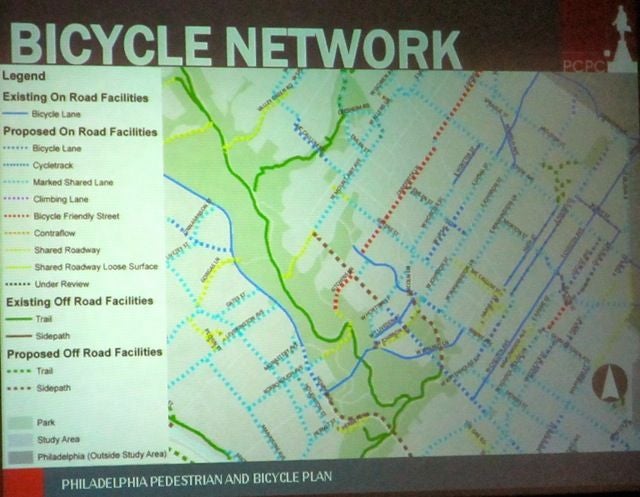
The plan currently covers about 40 percent of the city (Center City and parts of northwest Philly), but two other recent grants, including one from the Centers for Disease Control, will allow the entire city to be covered in the 21-month project.
Contact the reporter at ThomasWalsh1@gmail.com.
WHYY is your source for fact-based, in-depth journalism and information. As a nonprofit organization, we rely on financial support from readers like you. Please give today.



